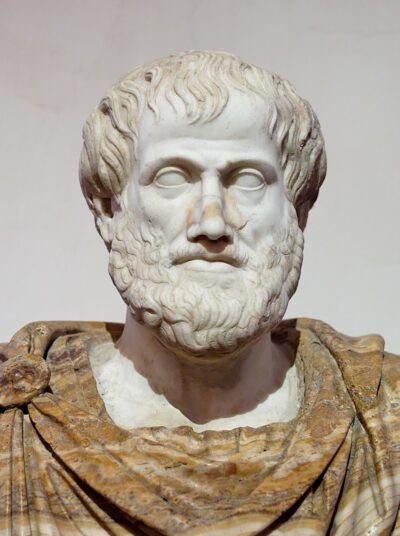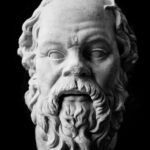We continue our journey in the history of music theories, this time focusing on the great Greek philosopher, Aristotle.
Who was Aristotle?
Aristotle (384–322 BC) was a Greek philosopher in ancient Greece, during the classical period. He covered various subjects from politics to music, from logic to ethics, from biology to government.
It is impossible to make even an estimation of how wide and deep his influence is on these subjects and on Western thinking.
He was born in Stagira, in Northern Greece, brought up by a guardian. As a young man in his late teenage years, he entered Plato’s Academy in Athens and remained there till his mid-thirties. After Plato died, he left Athens and joined king Philip II of Macedon, to train his son Alexander the Great.
In his life Aristotle produced hundreds of books (papyrus scrolls), what remained to us is estimated to be only the third of all his writings. After the death of Alexander the Great, he was forced to flee to Chalcis on Euboea, where he died the same year.
Aristotle was one of the greatest intellectual figures of Western history.
Aristotle on music
Throughout history theorists agreed that music has moral significance and that it influences the human character, shapes a person’s morality. The most confident and influential representatives of this idea were the Greek philosophers, like Aristotle. Ancient Greek philosophers mainly focused in their music theory on its capacity to imitate emptions and the social value it generated through self-development (forming virtue in the citizen).
It is also important to see, when ancient Greeks talk about music they mean a broader set of art forms, not only instrumental music, but music always combined with poetry or movement (dance). This goes the other way around, too. Meaning, poetry for example, was always accompanied by music or singing. This does not mean they were not dealing with music in itself, smaller units of music like melody or rhythm were parts of the music theory.
Following the steps of Plato, Aristotle also firmly established the notion that music is affecting human soul in lasting manner. “There seems to be in us a sort of affinity to musical modes and rhythms, which ensures that we are affected in a certain manner.” – says Aristotle and adds, “rhythms and melody contain representations of anger and mildness and also of courage and temperance and all their opposites and other ethical qualities…”
In other words, certain music can encourage and nurture good character, others the opposite, immoral traits.
|Related: Plato on music
Education in music is important -also- in Aristotle’s view and he even introduces a word used for the power of music to influence emotions and even morals: ethos.
In the Aristotelian music theory music has two main applications. One belongs to the domain of education, the other is pleasure.
For Aristotle all arts are imitative. He observed that humans are prone to imitations from early childhood, as being a way of learning. In his understanding music is unique as it is capable to arouse the emotions it imitates. Here he makes a distinction with other arts, like painting, where a painter is only representing a certain emotion (sign of emotion vs the emotion itself).
In his work Politics he says, “…when men hear imitations, even apart from the rhythms and tunes themselves, their feelings move in sympathy. Since then music is a pleasure, and excellence consists in rejoicing and loving and hating rightly, there is clearly nothing which we are so much concerned to acquire and to cultivate as the power of forming right judgments, and of taking delight in good dispositions and noble actions.”
In other words, according to Aristotle, if musical education is focusing on imitating states of morally good, in real life listeners will be pleased with (and drawn to) such states.
|Related: Pythagoras on music
Aristotle introduces another key word in his unified music theory: catharsis. According to this understanding, music can be an instrument to balance a person’s emotional state. Both ends of the extreme emotional states are to be avoided (golden mean) and music helps a person to achieve that by moderating the feelings from the extreme.
In question of music as pleasure, Aristotle’s music philosophy gets more relaxed and forgiving compared to Plato’s. Aristotle believes that music can be an agent of pleasure and as such this “feature of music” in itself is beneficial. He holds that regularly listening to music should be part of a cultivated life. For Plato, it is beneficial only as long as it serves the building of a better personality.
Another area where Plato and Aristotle differ in opinion is the question of purely instrumental music. For Plato music always should have a vocal part, in fact the music should serve the mood of the lyrics. For Aristotle instrumental music in itself is good, since it is capable to use rhythm and melody to arouse emotions.






